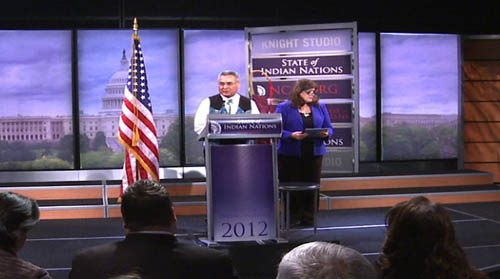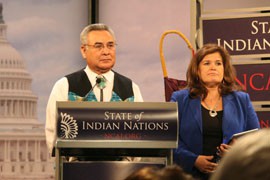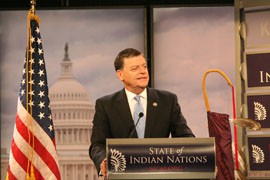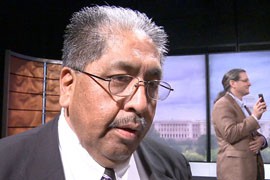Cronkite News has moved to a new home at cronkitenews.azpbs.org. Use this site to search archives from 2011 to May 2015. You can search the new site for current stories.
Native American leaders ask for support, flexibility to govern
WASHINGTON – Native American leaders called on the federal government Thursday to honor its responsibility to American Indians with continued financial support, but to grant them greater flexibility in handling their own affairs.
“Protecting the Indian budget is the first step, but long–term success depends on tribal nations having the same opportunities to protect and preserve our communities that are available to state and local governments,” said Jefferson Keel, president of the National Congress of American Indians.
Keel was delivering the State of Indian Nations address, held annually by NCAI after the president’s State of the Union.
The wide–ranging speech touched on everything from education to public safety and energy independence.
Keel called on Congress to pass the SAVE Native Women Act, which would give tribes greater authority over people accused of committing violent acts against women on native land. He also urged action on bills that would increase self–determination for renewable energy development on Native lands.
But most of the address focused on issues of federal trust and self–governance.
Keel said tribal leaders are concerned that federal budget tightening could result in cuts of 10 to 15 percent in Indian programs over the next decade. He argued that the federal trust responsibility is a “solemn agreement” that should be exempt from discretionary spending cuts.
He also said tribal governments could become more efficient if they were given the freedom and authority to manage their own programs and cut red tape.
“Tribal nations have proven our capacity,” Keel said. “We don’t need the government involved in all our business decisions, we need flexibility. And by creating it (flexibility), we will remove the barriers that cost us jobs and opportunity.”
Speakers urged Washington to act, noting that the issues they care about are neither Republican nor Democratic, but Indian issues.
Ned Norris Jr., chairman of Arizona’s Tohono O’Odham Nation, said that federal leaders need to work with and support tribes on issues that matter to Indians.
“These are issues that are really going to require bipartisan cooperation,” he said.
Congressional leaders at the event pledged to work with tribal governments and work across party lines.
Sen. Daniel Akaka, D–Hawaii, and chairman of the Senate Indian Affairs Committee, agreed that native governments had shown their capacity to meet the needs of their people, and said he is committed to reminding his colleagues about the government’s promises to tribal nations.
“We will work with you to build a foundation for a new era in the government–to–government relationship,” Akaka said.
In the official congressional response to the address, Rep. Tom Cole, R–Okla., called these the “best and worst of times” for American Indians.
Cole, a member of the Chickasaw tribe, said that while there has been much bipartisan action in Congress on issues important to Native Americans, the obstacles these communities face are monumental. He said there should be few, if any, priorities higher for the federal government than the trust relationship it has with tribal nations.
“The first Americans are still … the last Americans,” Cole said.
But he believes tribal nations are on the road back to strenghtening their sovereignty and identity and recognizing the contributions of Indian nations.
Cole and the tribal leaders praised the Obama administration’s record on Indian affairs, saying the president has lived up to many of his promises to tribes. They also called on candidates to include Native communities in their discussions so Indian interests will be represented going forward.
“It’s critically important that all candidates involve tribal communities to the table regardless of party lines,” Norris said.
In spite of the challenges facing Native Americans, Keel also expressed hope for the future of Indian communities.
“Tribal leaders carry with us a dream. It’s a dream passed down from our parents and grandparents,” Keel said. “We see a future where the trust relationship actually works: Works for tribal nations, and works for our federal partners.”











